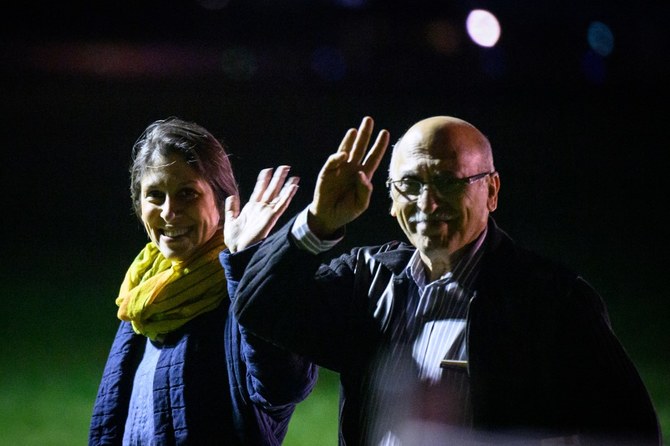LONDON: A British-Iranian who was released this month after almost five years of detention in Tehran’s Evin prison has described the “hell” he endured.
Anoosheh Ashoori, 68, was arrested in August 2017 when he was visiting his elderly mother in Iran. She had just had a knee operation.
But during his visit, Ashoori was bundled into a van by Iranian authorities and accused of spying for Israel.
In some of his first comments since returning from Iran, he told the BBC this week: “I still can’t believe sometimes that I am back.
“When I was in my cell, I used to pinch myself when I was dreaming that I was with [my wife] Sherry. Then I would wake up to the reality of being in my cell. Here, it’s the other way around.”
The conditions were repulsive. Bedbugs and cockroaches infested the cell, which kept up to 15 people. Ashoori had to make his own earplugs out of wire and foam so he could have some peace for sleeping.
“Although many of them are highly educated, it is very difficult for all of you to always live in peace together. So sometimes fights happen. But then we learn to live with each other because we don’t have any other choice.”
At the start of his arrest, he was held in solitary confinement and subjected to relentless interrogation.
“I’ve put that behind me. I try not to think about it much,” he told the BBC, adding that the regime also tried to break him by making threats against his family. He regularly attempted suicide but was prevented by the prison guards.
But above all the pain he endured, Ashoori said the worst aspect of his detention was witnessing the suffering felt by others in the prison. Many were driven mad by lengthy incarceration.
“There are people there who are like zombies,” he said, adding: “They just go back and forth in the yard. Sometimes you see them talking to themselves and gesticulating. They’re in their own world.”
Memories of his family and support from fellow inmates kept him going. “When you are in your cell, you’re always looking behind you. You’re always trying to remember all the good memories that you had with your family. You’re living in your memories.”
The days were long and tiring. He passed them with constant exercise and by forming a poetry society for other inmates.
But now he is free. He has been adjusting to the sudden change in lifestyle. Fresh from the “hell” of Evin prison, he has been reacquainted with his favorite beer and full English breakfasts.
He said: “Even when I’m awake, for example sitting in the garden, I sometimes say this cannot be true, this cannot be happening. I must be in my cell and I’m expecting any moment to wake up. So I’m preparing myself not to be too upset when I wake up. It’s still quite a challenge for me to be easy with being here.
“Still at night sometimes I touch Sherry’s hand to see if this is real, if this is happening.”
His sudden arrest and detention came as a grave shock to his family, who assumed the authorities had made a mistake. Ashoori, an engineer, had never been involved in politics.
He had helped create a device to protect Iranian homes from earthquakes, which was distributed in 2003.
In London, he produced self-heating boots that his daughter could wear while working on a cake stall in Greenwich Market.
Eventually, the harsh reality of his situation became clear: the Iranian regime was using him as a bargaining chip with the British government over a decades-old military debt owed since the 1970s.
The controversial debt had been debated in British politics for some time, with many arguing that the money should not be paid due to sanctions on the regime and over fears that it would use the money to enhance its campaign of terror.
Ashoori said: “It wasn’t me who was important, it was the passport that was being arrested — but the holder of that passport was me.”
Ashoori was released along with Nazanin Zaghari-Ratcliffe, a fellow dual national arrested on similar trumped-up charges, after Britain paid the money from a tank deal that was not fulfilled after the revolution of 1979.
Tehran and London have both claimed that the payment and the release of the prisoners are not linked.
But there are still others enduring the “hell” that Ashoori escaped from. British-born wildlife conservationist Morad Tahbaz was left behind.
“He’s ill and needs medical attention,” Ashoori said. “Sometimes I think it should have been him instead of me on that plane, and the guilty feeling you have that you have left all these good people behind is really painful. That is something I cannot come to terms with. I urge [British Prime Minister] Mr. Johnson to complete this good work and to make sure that they are back — Morad and the other British nationals.”


























